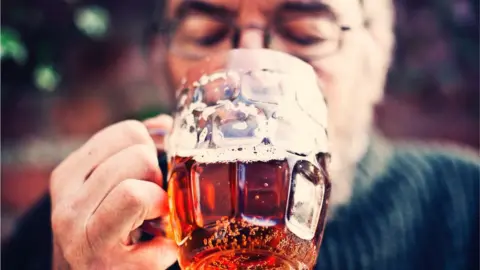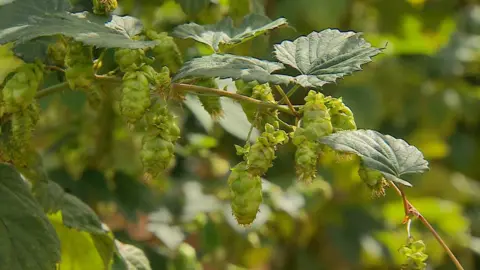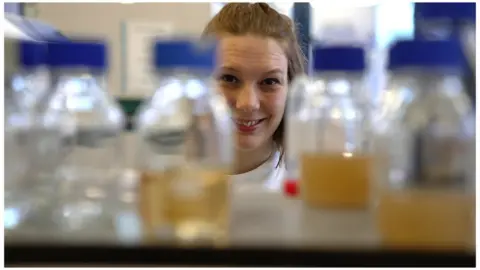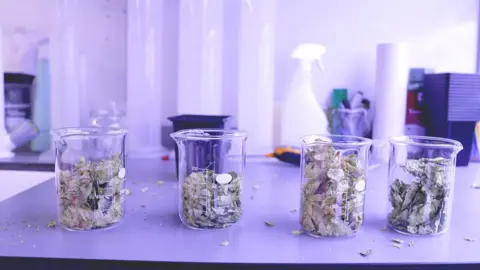Fears for the future of the great British pint of beer
 Getty Images
Getty ImagesClimate change threatens to "call time" on the great British pint.
But scientists are working with the brewing industry to help save it.
Hops give bitter its taste but the plant doesn't like the hotter, drier conditions we've experienced in recent decades and production has plummeted.
Researchers in Kent are isolating hop genes in the hope of producing more climate-change resilient varieties.
They also want to produce more intense flavours that are now becoming popular.
"Without it, the British pint is going to die off," Danielle Whelan of the Shepherd Neame brewery said of the work.
"We are just going to be importing beer and we won't have the culture that goes with it anymore."

Warmer, drier conditions have also affected the trademark bitter flavour hops gives beer. And the worry is that because of climate change, the problem is only going to get worse. Eddie Gadd, the head brewer at Ramsgate Brewery said that it was already having an impact.
"Climate change is very relevant to me," he said.
"I buy most of my hops from Kent and I've seen the harvests over the past 10 or 12 years going up and down. It has been a real rollercoaster.
"The growers have been feeling the impact and the search for drought-resistant genes is going to be exceptionally important."
It is an issue across Europe. An analysis published last year found that in some key hop-growing areas, there was a drop of nearly 20% in output.
The new research is co-led by Dr Helen Cockerton of the University of Kent. She will be analysing the genetic code of hundreds of different varieties. Dr Cockerton will be searching for genes in plants that are drought-resistant which could be crossbred with plants that are currently grown for use in beer production.
 BBC/Kevin Church
BBC/Kevin ChurchShe will also be searching for genes that give beer added flavours, some of which may not be popular now, but could become fashionable in a few years' time. The current trend is for a strong, "punchy" taste.
"Brewers want good-tasting beer, so they need their hops to produce the flavour their customers want," she said. "But the growers are more interested in having plants that are able to produce good yields in the field in the presence of diseases and droughts.
"Our aim is to give plant breeders the information they need to do both."
Dr Cockerton is working with Dr Klara Hajdu, a hop breeder with Wye Hops. Dr Hajdu will breed the new varieties with the new drought, disease and flavour genes to see if they grow well in the field.
"I am very optimistic," she told BBC News.
"We can speed up this breeding process if we know what traits to look for in the DNA and it will be much easier to produce these plants."
 BBC/Kevin Church
BBC/Kevin ChurchThen the most important test of all: Dr Hajdu will then ask Eddie Gadd to produce beer from the experimental varieties.
The master brewer told BBC News: "The great news from my perspective is that 10 years ago, I was sceptical that we could produce intense flavours in hops in our climate."
He added: "What I have seen is that absolutely we can."
The project is part of a larger research initiative funded by the Department for Environment, Food and Rural Affairs (Defra) to future-proof UK food production against challenges such as climate change. The Farming Minister, Mark Spencer said he was "delighted" to see projects like the beer study roll out.
"We will continue to provide opportunities, funding and support to empower [brewers] to put innovation at the heart of modern agricultural practices."
Follow Pallab on X, formerly known as Twitter.
